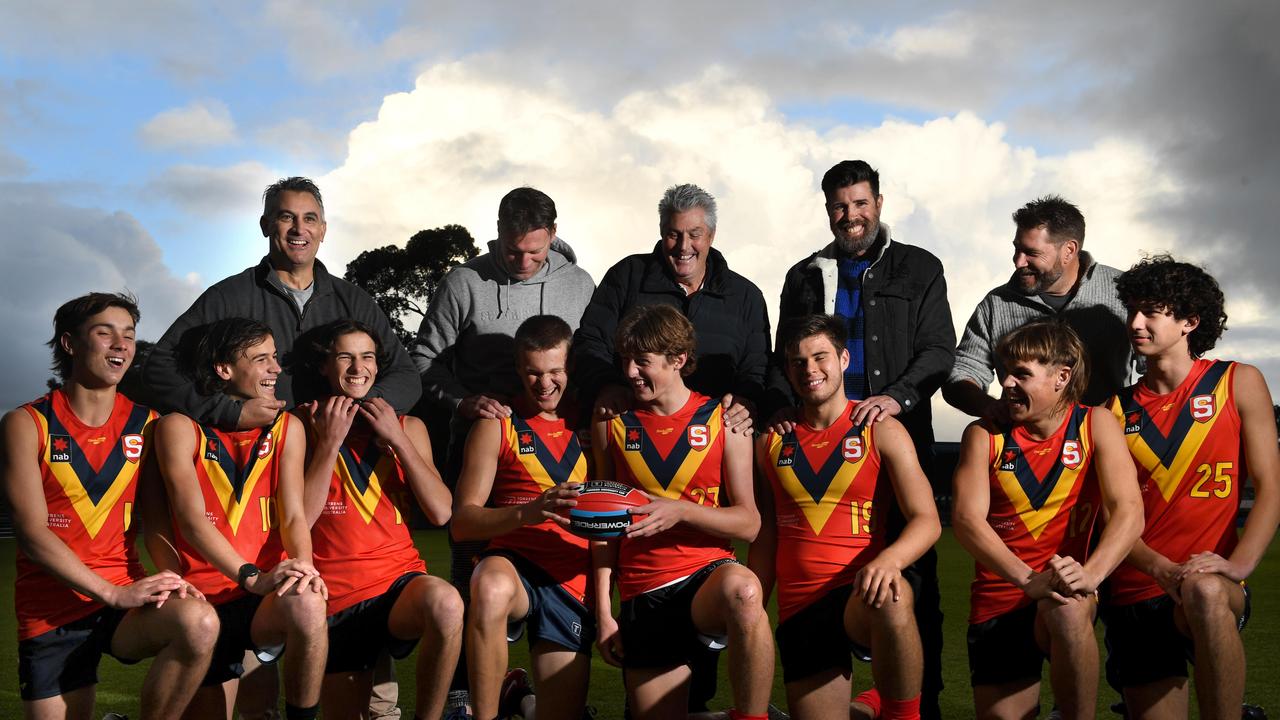Teenager with Tourette syndrome makes AFL history on debut
When Tom Cochrane was nine and being bullied, he told his mum he wanted to be the first AFL player with Tourette syndrome. Now 19, the Port Adelaide youngster has just achieved his dream

READING LEVEL: GREEN
Teenager Tom Cochrane has become the first AFL player with Tourette syndrome (TS) after the 19 year-old made his debut* playing against Essendon on Thursday night.
TS is a neurological disorder* that causes sudden, involuntary* vocal sounds and body movements.
“When I was nine I started having vocal tics* and screaming out words and was really confused,” the Port Adelaide local told AFL.com.au earlier this year.
“It was really hard because I didn’t know what it was. I was in Year 3 and was always walking around doing tics and weird movements with my head. I didn’t know what I was doing.
“I was at school once and an older student was saying I had Tourette’s and I was like, ‘What’s Tourette’s?’. They filled me in on it and I realised that’s probably what I had.”
Nowadays, Cochrane manages the disorder with medication but he told AFL.com.au that he experienced bullying at school because of the involuntary movements and words that would come out of his mouth as a result of the disorder.

School assemblies, where students are expected to remain quiet, posed a problem for Cochrane, who would blurt out words without wanting to.
“They’d be like, ‘What’s going on with that guy?’,” he said.
“The first couple of years it was hard because I got a lot of stuff for it, people making fun of it and trying to bring me down. Once I got older, everyone got used to it and acknowledged it and nobody really cares anymore.”
While the medication he takes has helped him control his movements, Cochrane still has a challenging time with vocal tics – especially when he is inactive* or bored. However, as he has grown older, he has gained better control over the tics as they arise.
“Every tic I have is basically a swear word but I’m just not letting them out right now,” he told AFL.com.au’s reporter with a smile.
“I try to keep them in but they can come out and it still fazes me a bit. Because in some situations I really don’t want to let it out, like when the coach is talking. I try to hold it in as best I can but sometimes it comes out anyway.”

He said there was one place where they don’t seem to bother him: the footy field.
“That’s probably the best thing about it – that I don’t get it when I’m playing. It kind of goes away because I enjoy playing, and when I’m enjoying something, it goes away,” he said.
As the son of former Power player Stuart Cochrane, the footy-loving teen has long held big ambitions to play in the AFL and has never let his TS diagnosis stand in his way. In fact, when he was nine years old he told his mum, “I want to be the first AFL player with Tourette’s”
“My mentality* has always been to stay positive,” he said.
TOURETTE SYNDROME
According to the Tourette syndrome Association of Australia, TS is a type of Tic disorder that involves multiple movement-based tics and one or more vocal tics that last for more than one year, though not always happening at the same time. Tics can be thought of as involuntary repetitive movements* and vocalisations*.

People with TS can have some control over their tics, however, the control only delays more severe outbursts. In other words, they can hold them back for a while, but eventually they will come out even stronger than before.
“Tics are experienced as a build up of tension, are irresistible and eventually must be performed,” the association’s official site states. “Typically tics increase as a result of tension or stress and decrease with relaxation or concentration on an absorbing task.”
While many people think of swearing as being the main symptom of TS, this is far from the truth. Coprolalia, the involuntary outburst of socially inappropriate words, only affects about 10 per cent of people with TS, according to the UK’s National Health Service.
TS usually begins between the ages of 2 and 21 and lasts for a person’s lifetime. There is no known cure and the condition is not degenerative – that is, it doesn’t worsen a person’s health or function over time.

In Australia it is estimated that one in every 100 school-aged children may have Tourette syndrome.
It’s not completely clear what causes TS, though research has suggested it may have something to do with the abnormal metabolism, or chemical reactions, of the dopamine* neurotransmitter*. Genetics* may also play a part in its occurrence.
Medication is available but unless symptoms are having a massive impact on a person’s life, it may not be necessary, states the Tourette syndrome Association website. There is also a behavioural treatment called CBIT* that may be helpful in training people to manage tics.
TS doesn’t affect a person’s intelligence or IQ and the majority of people with the condition live normal lives.
“Many reach high achievement in the areas of academia*, business and sportsmanship,” states the association.

To learn more about Tourette syndrome visit tourette.org.au
IF THIS STORY HAS AFFECTED YOU, PLEASE LET SOMEONE KNOW
If you are experiencing bullying or if this article has affected your wellbeing, please let a trusted person know. If not a parent, teacher or good friend, these organisations are here to help:
Dolly’s Dream Support Line: 0488 881 033
Kids Helpline: 1800 551 800
Lifeline: 13 1114
TIACS: 0488 846 988
Mental Health Access Line: 1300 642255
Suicide Call Back Service: 1300 659 467
13 YARN: 13 9276
Beyond Blue: 1300 22 4636
ReachOut: au.reachout.com
POLL
GLOSSARY
- debut: first time playing
- neurological disorder: a disease of the nervous system, including the brain and nerves
- involuntary: done without will or conscious control
- vocal tics: repetitive, involuntary sounds or words spoken, including grunting, barking, throat clearing, coughing and hissing
- inactive: not moving or exercising
- mentality: the way you think about things
- repetitive movements: movements done over and over again
- vocalisations: sounds made by the voice not considered to be words
- dopamine: a chemical messenger released from nerve cells in your brain to do many things, but one of the main things it does is give you a good feeling after you do something enjoyable. Another thing it does is help your brain control your movements
- neurotransmitter: molecules that act as chemical signals, allowing communication between neurons and other cells as part of the functioning of the nervous system
- genetics: the genes passed on to us by our parents
- CBIT: Comprehensive Behavioural Intervention for Tics, a behavioural therapy that aims to teach people to change their behaviour over time so they have less tics by training patients to be more aware of their tics, training them to do competing behaviour when they feel the urge to tic and changing lifestyle patterns that may be helpful in reducing triggers that bring on the urge to tic
- academia: the world of professional study and research
EXTRA READING
Warnie’s MCG wish to come true
Aussie teen eyed for quarterback
Sport win for nation’s diabetic kids
QUICK QUIZ
1. Which AFL team does Tom Cochrane play for?
2. How old was he when he was diagnosed with Tourette syndrome?
3. What are tics?
4. When does Cochrane not experience tics?
5. What percentage of people with Tourette syndrome experience involuntary outbursts of swearing or inappropriate language?
LISTEN TO THIS STORY
CLASSROOM ACTIVITIES
1. How can they help?
Create an information poster. The purpose of your poster is to help teachers understand how they can help kids with Tourette’s in their classroom feel accepted and supported.
Time: allow at least 25 minutes to complete this activity
Curriculum Links: English, Health and Physical Education, Personal and Social Capability
2. Extension
What makes a person a great role model? Why are good role models important? Use information in the story to help you to write or create something inspired by these questions.
Time: allow at least 25 minutes to complete this activity
Curriculum Links: English, Personal and Social Capability
VCOP ACTIVITY
Vocabulary recycle
There is some vivid vocabulary being used in the article, and I am not just talking about the glossary words. Go through the article and highlight the high-level language that you are impressed by in yellow.
See if you can borrow two of these wow words to reuse in your own way.
Remember vocabulary is a great way to connect with the audience, but you need to think about who your audience is so you make great word choices.
Who will the audience be in your recycled sentences?

